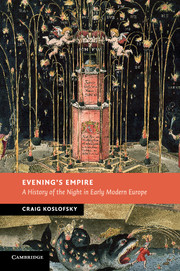It's Evening's Empire: A History of the Night in Early Modern Europe, by Craig Koslofsky, published last June.
I've often wondered how and when we adopted the habit of going to bed in the middle of the night and getting up half way through the morning. If you sleep 8 hours, then a rational arrangement of your day would surely be to retire at 8 and rise at 4.
And it turns out that’s indeed how it was until very recently. In 1710, Richard Steele wrote in The Tatler of a visit to an old friend just come up to town from the country. Calling at 8 in the evening Steele was surprised to find his friend already gone to bed. He returned at 11 the following morning, only to be told that his friend had just sat down to dinner. “In short”, Steele commented, “I found that my old-fashioned friend religiously adhered to the example of his forefathers, and observed the same hours that had been kept in his family ever since the Conquest”.
A theme of Fanny Burney’s novel Evelina published in 1778, is the unsophisticated country girl’s surprise at fashionable London customs, which include, she finds, eating dinner “when the day is almost over”. [1]
A theme of Fanny Burney’s novel Evelina published in 1778, is the unsophisticated country girl’s surprise at fashionable London customs, which include, she finds, eating dinner “when the day is almost over”. [1]
I'll just digress here to mention the Fianna Fail politician Mark Killilea, active in the 1980’s, who considered himself as representing the plain people of Ireland, "the people who eat their dinner in the middle of the day" – a remark often quoted, nowadays normally ironically.
But my theme was night, so back to Richard Steele, writing in 1710. During the previous generation or so “nocturnalisation” had occurred: elites across Europe had moved their clocks forward by several hours. No longer a time reserved for sleep, the night was now a time of recreation for the rich and work for those who waited on them. Presumably the elites started this as they could afford the most candles. But even so, just because you can do something, doesn't mean you do it. What was the actual motive? And when did the peasants and workers follow suit?
But my theme was night, so back to Richard Steele, writing in 1710. During the previous generation or so “nocturnalisation” had occurred: elites across Europe had moved their clocks forward by several hours. No longer a time reserved for sleep, the night was now a time of recreation for the rich and work for those who waited on them. Presumably the elites started this as they could afford the most candles. But even so, just because you can do something, doesn't mean you do it. What was the actual motive? And when did the peasants and workers follow suit?
 |
| 18th century chandelier - light to rule by |
And now here’s a book that tells us these things.
Two reviews: one from Times Literary Supplement and one from History Today.
Here's a curiosity from the History Today review. It seems that in early rural communities there were two segments of sleep with a waking interval. Huh? Sounds like a siesta. That can't be right. Which was replaced in cities with a single phase of sleep. Then the schedule of the urban day slipped back: and rising, mealtimes and sleep all occurred later.
I must get hold of this book. According to other reviews I've seen it's overly academic but worth the slog.
As a postscript, Jared Diamond or someone has calculated that whereas it now costs us 5 cents for the electrical energy needed to read for an hour at night, in the 18th century an agricultural worker would have to work for two hours to afford an hour’s worth of candle and in the 12th century they would have to work for a day. I've made those figures up because I can't lay my hands on the reference. I thought it was in Jared Diamond’s Guns Germs and Steel but I've failed to locate it there. I understand poor Saxons used rush lights (rushes dipped in animal fat). Can't find an image of one of these.
PS Just come across another book that might cover some of the same ground: Brilliant: The Evolution of Artificial Light by Jane Brox “a sweeping history of our transformative relationship to light”. Published 2010, I think.
[1] “Before our dinner was over yesterday Madame Duval came to tea; though it will lessen your surprise, to hear that it was near five o'clock, for we never dine till the day is almost over.” Evelina, Penguin Classics 1994, Letter XVI. An editor’s note explains that this implies dining at three-thirty or four o’clock, although eve more fashionable people had already pushed the dinner hour to 6 o’clock

No comments:
Post a Comment